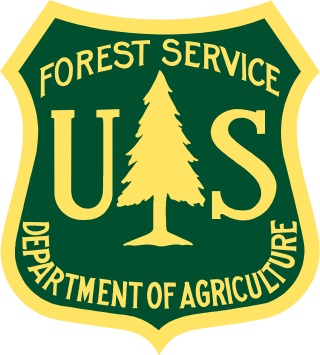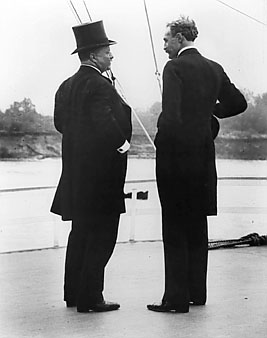Related Research Articles

The United States Forest Service (USFS) is an agency within the U.S. Department of Agriculture that administers the nation's 154 national forests and 20 national grasslands covering 193 million acres (780,000 km2) of land. The major divisions of the agency are the Chief's Office, National Forest System, State and Private Forestry, Business Operations, as well as Research and Development. The agency manages about 25% of federal lands and is the sole major national land management agency not part of the U.S. Department of the Interior.

In the United States, a conservation easement is a power invested in a qualified land conservation organization called a "land trust", or a governmental entity to constrain, as to a specified land area, the exercise of rights otherwise held by a landowner so as to achieve certain conservation purposes. It is an interest in real property established by agreement between a landowner and land trust or unit of government. The conservation easement "runs with the land", meaning it is applicable to both present and future owners of the land. The grant of conservation easement, as with any real property interest, is part of the chain of title for the property and is normally recorded in local land records.
Natural Resources Conservation Service (NRCS), formerly known as the Soil Conservation Service (SCS), is an agency of the United States Department of Agriculture (USDA) that provides technical assistance to farmers and other private landowners and managers.
The Indiana Department of Natural Resources (DNR) is the agency of the U.S. state of Indiana. There are many divisions within the DNR and each has a specific role. The DNR is not only responsible for maintaining resource areas but also manages Indiana's fish and wildlife, reclaims coal mine ground, manages forested areas, aids in the management of wildlife on private lands, enforces Indiana's conservation laws, and many other duties not named here. According to the department's website, their mission is "to protect, enhance, preserve, and wisely use natural, cultural, and recreational resources for the benefit of Indiana's citizens through professional leadership, management, and education".
The Clarke–McNary Act of 1924 was one of several pieces of United States federal legislation which expanded the Weeks Act of 1911, and was named for Representative John D. Clarke and Senator Charles McNary.

Yale School of the Environment (YSE) is a professional school of Yale University. It was founded to train foresters, and now trains environmental students through four 2-year degree programs, two accelerated degree programs for graduates of Yale College, and a 5-year PhD program. Still offering forestry instruction, the school has the oldest graduate forestry program in the United States.
The Historic Preservation Fund (HPF) provides financial support for historic preservation projects throughout the United States. The fund is administered by the National Park Service (NPS), pursuant to the National Historic Preservation Act of 1966 (NHPA). The fund provides state historic preservation agencies with matching funds to implement the act.
Private landowner assistance program (PLAP) is a class of government assistance program available throughout the U.S. for landowners interested in maintaining, developing, improving and protecting wildlife on their property. Each state provides various programs that assist landowners in agriculture, forestry and conserving wildlife habitat. This helps landowners in the practice of good land stewardship and provides multiple benefits to the environment. Some states offer technical assistance which includes:
In the late nineteenth century, about 30% of Ethiopia was covered with forest. The clearing of land for agricultural use and the cutting of trees for fuel gradually changed the scene, and today forest areas have dwindled to less than 4% of Ethiopia's total land. The northern parts of the highlands are almost devoid of trees. However, about 45,000 square kilometres of dense forest exist in the southern and southwestern sections of the highlands. Some of these include coniferous forests, found at elevations above 1,600 meters, but a majority of the forestland consists primarily of woodlands found in drier areas of the highlands and in the drier areas bordering the highlands.

The Oregon Board of Forestry is responsible for forest policy and oversight of forest management practices within the state of Oregon. The board appoints the state forester and oversees the Oregon Department of Forestry. The board also works with private land owners and the Federal Government to promote consistent forest management policies throughout the state.
The Virginia Department of Forestry (VDOF) was established in 1914 to prevent and suppress forest fires and reforest bare lands. Since its inception, the agency has grown and evolved to encompass other protection and management duties:
The Cooperative Funds Act is a United States law, or series of laws, which authorized the United States Forest Service (FS) to collect donations from private partners to perform FS work. Contributions had to be voluntary, and by cash, check, or money order only. It was also stipulated that there could be no conflict of interest between the donor and the FS.

Starting in 1876, and undergoing a series of name changes, the United States Forest Service of the Department of Agriculture grew to protect and use millions of acres of forest on public land. Gifford Pinchot, an early advocate of scientific forestry, along with President Theodore Roosevelt and conservation organizations, led the effort to manage forest for the public good.

The Food, Agriculture, Conservation, and Trade (FACT) Act of 1990 — P.L. 101-624 was a 5-year omnibus farm bill that passed Congress and was signed into law.
The Stewardship Incentives Program (SIP) is a program administered by the United States Forest Service through the Farm Service Agency that provided up to 75% cost sharing for silvicultural activities implementing approved renewable resource plans. The program was terminated in the 2002 farm bill, and replaced with the Forest Land Enhancement Program (FLEP).
Private nonindustrial forest lands are forest lands in various countries, owned by private individuals or organizations that do not also own a wood processing facility.
The Forestry Incentive Program (FIP), initiated in 1975 and administered by the Natural Resources Conservation Service, provided financial assistance for up to 65% of the cost of silvicultural activities on nonindustrial private forest land of generally less than 1,000 acres (405 ha). The program was terminated in the 2002 farm bill, and replaced with the Forest Land Enhancement Program (FLEP).
Pennsylvania Department of Community and Economic Development is a cabinet-level state agency in Pennsylvania. The mission of the department is to enhance investment opportunities for businesses and to improve the quality of life for residents. The department works to attract outside corporations, spur expansion of existing local employers, and foster start-ups by providing tax incentives and technical assistance. Additionally, the agency provides grant funding to community groups and local governments for projects such as revitalizing "Main Street" infrastructure, enhancing low income housing availability, or improving access to technology.
The Papua New Guinea Forest Authority (PNGFA) was established in 1993 under the Forestry Act, 1991. It replaced the former Department of Forest and unified all the Provincial Forest Divisions and the Forest Industries Council. This restructuring was the result of the 1989 Barnett Commission of Inquiry into forestry in Papua New Guinea.
Pacific Forest Trust is an accredited non-profit conservation land trust that advances forest conservation and stewardship solutions. Its mission is to sustain America's forests for their public benefits of wood, water, wildlife, and people's wellbeing, in cooperation with landowners and communities.
References
![]() This article incorporates public domain material from Jasper Womach. Report for Congress: Agriculture: A Glossary of Terms, Programs, and Laws, 2005 Edition (PDF). Congressional Research Service.
This article incorporates public domain material from Jasper Womach. Report for Congress: Agriculture: A Glossary of Terms, Programs, and Laws, 2005 Edition (PDF). Congressional Research Service.

